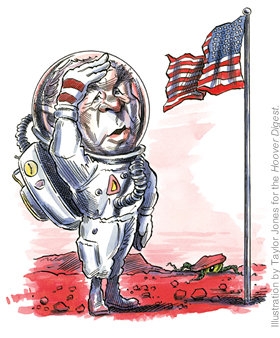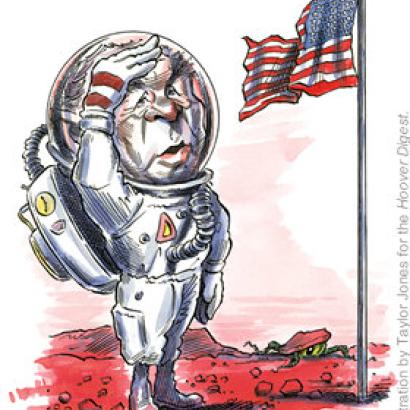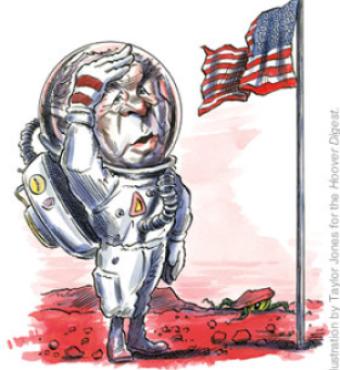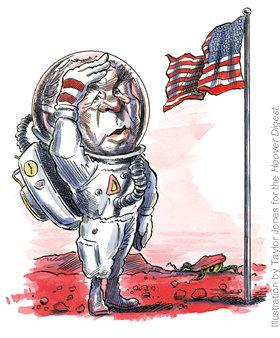- The Presidency
- Energy & Environment
- Politics, Institutions, and Public Opinion

Historians will look back on early 2004 as a momentous period in the life of our universe. The landing of two exploratory vehicles on Mars and President George W. Bush’s speech at NASA headquarters on January 14 indicate that the world has embarked on a new age of space exploration. Sending astronauts to the moon is no longer a sufficient goal, as it was for an earlier generation. The president has clearly indicated that NASA’s new mission will transform the moon into a base for the “next steps of space exploration: human missions to Mars and worlds beyond.” This is the most ambitious space agenda in history, and it has not received the serious public attention that it deserves.
At first glance, Bush’s words evoke parallels with President John F. Kennedy’s muscular rhetoric in the early 1960s. Just as Kennedy promised that reaching the moon would “organize and measure the best of our energies and skills,” Bush announced that “we choose to explore space because doing so improves our lives and lifts our national spirit.” Kennedy and Bush both spoke of space exploration as an exercise in strengthening the technical proficiency and moral fiber of the nation. Not surprisingly, the Bush White House issued a press release that described a “desire to open new frontiers”—the exact pioneering imagery espoused by Kennedy.
The differences between the Bush and Kennedy space programs, however, far exceed the surface similarities.
The Great Space Race
For Kennedy, space exploration was a race against the Soviet Union, a Cold War battle to prove American superiority. His famous call for “landing a man on the moon and returning him safely to earth” was to be a benchmark of how a free society could outperform an authoritarian competitor. When Kennedy announced that space travel was an “urgent national need” in May 1961, the Soviet Union appeared to have a dangerous lead in this field of endeavor. Moscow had launched the first artificial earth satellite, Sputnik I, in October 1957. The Kremlin had also sent the first man into space, Yuri Gagarin, a month before Kennedy’s speech.
Many Americans feared that the apparent Soviet lead in space would become permanent, posing a strategic threat to the security of the United States and its allies and demoralizing anti-communist forces around the globe. Kennedy issued his clarion call to mobilize Americans against these threatening prospects. A marriage of the most sophisticated scientific minds with the vast resources of the nation would display the power of American ingenuity. If a U.S. astronaut reached the moon first, as Kennedy promised, this would wipe out the perceived Soviet lead and prove the dynamism of liberal capitalism to the entire world. The Cold War stakes in the 1960s were enormous; space exploration was one of many races the United States had to win for long-term victory over communist tyranny.
Beyond this Cold War context, space travel served few other purposes for Kennedy and his immediate successors. The research benefits from scientific experimentation in space did not seem to justify the huge costs incurred. No one seriously advocated resource extraction or human settlement in space in the short term. Therefore, when the United States won the race to the moon in 1969, public interest in more-ambitious missions quickly dissipated. Americans saw little value in pushing this new frontier any further at the time. After years of scientific and political mobilization, citizens of the United States and most other countries turned inward, largely ignoring outer space in the succeeding decades. The 1970s, in particular, was a decade when the great technological breakthroughs in space encountered profound public indifference.
A New Frontier for a New Millennium
This all changed with the arrival of the two exploratory vehicles on Mars and Bush’s recent speech. The president acknowledged that the United States faces no immediate competitors in space. Space is no longer a Cold War battleground because American military prowess and technological ingenuity are without parallel in today’s world. Space exploration is now part of an expansive vision of foreign policy that involves applying American power on a broad geographic canvas—from the Middle East to outer space. Just as we have increased the role of our military forces in various corners of the Earth during the last three years, we will now “extend a human presence across our solar system.” The president’s plans include the development of new spacecraft, the establishment of launching points outside the Earth’s atmosphere, and harnessing extraterrestrial resources that will “boggle the imagination” and “test our limits to dream.”
Bush’s program will create a new American empire in space that resembles the ocean-borne empires of the European states in the seventeenth and eighteenth centuries. The United States will stake claim to new “open” territories, leverage their resources, and settle them on a small scale. The president will make the maintenance and exploitation of American predominance in space an integral part of the nation’s long-term security calculations. Without this predominance, other states with growing space programs (especially the People’s Republic of China) could use their capabilities to imperil American communications and defenses. As in the era of ocean-borne exploration, travel to new horizons will enhance the strength of the nation and also inspire some of the virtues that Bush extols: “daring, discipline, ingenuity, and unity in the pursuit of great goals.”
This is a lofty vision that recognizes the promising opportunities of space travel and the grave risks of complacency along this future frontier. If the past is any guide, however, exploration will also bring its share of problems, even for a country as powerful as the United States. There are three difficulties, in particular, that we must prepare to confront in the years ahead: vulnerabilities, competition, and costs.
Exploration and expansion create vulnerabilities as well as opportunities. This is, as historian Paul Kennedy has explained, the paradox of empires. Exerting its control over space, the United States will gain valuable resources, prestige, and self-confidence. The nation will also become dependent on infrastructures that are far-flung and costly to defend. Entrepreneurial terrorists (pirates, in eighteenth-century terms) will attack the power lines and communications channels on Earth—and eventually in space—that make exploration possible. Space travel will also create vast new energy demands on fossil fuels and other nonrenewable resources on Earth. Successful space policy requires that we take serious measures to protect vulnerable communications networks and pursue alternative energy sources.
Bush’s program will inspire foreign competitors. Other advanced industrial societies, especially the People’s Republic of China, will want to show that they too can play in the big leagues. They will also fear for their security and prosperity with the United States in virtual control of the heavens. As in the ocean-borne age of exploration, space travel will surely create new sources of national conflict. The eighteenth century, in particular, was replete with wars among European states that centered on control of far-flung territories. A similar century of state-centered wars over space may stand before us. Washington should prepare for this eventuality by maintaining the necessary national military forces and working to create a body of international space law to help adjudicate inevitable conflicts of interest.
Space exploration will cost a lot of money. Republicans and Democrats have recognized this fact. As a consequence, many have shown a disinclination to embrace the president’s program. Bush’s speech at NASA headquarters contributed to this reaction by skirting the issue of funding. He pledged to raise the space agency’s annual budget by a paltry 5 percent in each of the next three years and just 1 percent in the subsequent two years. This is unrealistic. Transporting human beings to distant and unknown territories requires huge technological, institutional, and labor expenses. In the case of seventeenth- and eighteenth-century Europe, overseas exploration necessitated an entirely new financial system to raise and sustain sufficient capital. We should expect a similar reorganization of our economy in a new age of space travel. The United States might be able to fight the war on terror with minimal economic dislocation (and even this is unlikely), but extending a human presence across our solar system will involve a profound reassessment of earthly priorities. The president should not allow costs to dissuade him from his important vision, but he must address financial concerns forthrightly, showing that he is willing to pay the high price of space exploration by raising and allocating the necessary government revenues.
Setting Sail
Although difficulties are inevitable, the United States has much to gain from embarking on a new age of space exploration. The promises of knowledge, adventure, and resource acquisition are extraordinary. Young citizens need a progressive challenge that they can believe in. Our nation’s future security might also hinge on our ability to project power far above our common terrain.
One way or another, space exploration will move ahead in the next few decades. Americans really have no choice but to place themselves at the forefront of this endeavor. We should undertake this journey with optimism, goodwill, and a healthy dose of preparation for the stormy seas that lie ahead. Here President Kennedy’s words are most appropriate: “as we set sail we ask God’s blessing on the most hazardous and dangerous and greatest adventure on which man has ever embarked.”
















